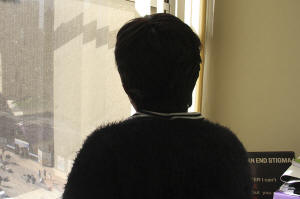South Africa's most vulnerable struggle to find HIV medication after US
aid cuts
[August 25, 2025]
JOHANNESBURG (AP) — On a warm evening in Johannesburg, the news spread
like wildfire among sex workers: Within 24 hours, several nonprofit
clinics providing free HIV services would be closing as President Donald
Trump announced the United States was slashing foreign aid.
Some South Africans living with, or at risk of, HIV secured supplies of
life-saving drugs just in time. Others did not.
Half a year later, the country with more people living with HIV than any
other is struggling to treat its most vulnerable. Over 63,000 people
were being treated in the 12 clinics across the nation that shut down.
Up to 220,000 people have faced disruption to their daily HIV
medication.
South Africa's government has vowed it won't let the U.S. withdrawal of
about $427 million in support collapse its HIV program, the largest in
the world.
Sex workers, among the most vulnerable South Africans as their work is
illegal, and transgender people spoke to The Associated Press on
condition of anonymity for fear of retaliation from families or
communities. They described a new world of difficulty in obtaining HIV
medication or the preventive medicine for people at risk of HIV.
One HIV-positive sex worker and mother of three said she was off
medication for almost four months after being turned away from public
hospitals, which the government's health department says should not be
happening.

“The only thing that I could think of was my kids, and that I am going
to die, and how am I going to explain to my kids that I am sick because
of the line of work that I chose?” she said. The 37-year-old said she
finally obtained a month’s supply of medication in June from a mobile
clinic that was introduced after the funding cuts. She didn’t know what
she would do after that.
Another HIV-positive sex worker said she had resorted to illegally
buying medication on the black market, where the pills have nearly
doubled in price.
The U.S. has since issued a limited waiver allowing the resumption of
certain life-saving HIV services globally, but the dismantling of much
of U.S. foreign aid has created chaos. And for many people affected,
harm is already done.
Overall, experts warn of hundreds of thousands of new infections in the
next few years in South Africa, and tens of thousands of additional
deaths, if the cuts in aid aren’t restored or covered by other means.
Turned away from hospitals
A major challenge for those who lost access to the U.S.-funded nonprofit
clinics is finding help elsewhere, including public hospitals.
“I have tried local clinics, three of them, and I have been refused
treatment because I don’t have a referral letter from my previous
clinic,” the 37-year-old sex worker said.
Kate Rees, a public health specialist at Anova Health Institute in
Johannesburg, said while it's ideal to have a transfer letter, it's not
needed and people can't be turned away.
“But people at the clinic, whether it’s nurses, security guards,
doctors, whoever actually, do turn them away,” Rees said.
In response to AP questions, Foster Mohale, a spokesperson for South
Africa's health department, said they were not aware of anyone who had
been turned away and encouraged people to go to the nearest public
health facility.
[to top of second column]
|

A 37-year-old HIV-positive sex worker and mother of three, who
requested anonymity, looks out her window in Johannesburg, South
Africa, Monday, June 23, 2025. (AP Photo/Louise Dewast)
 Another challenge at public
hospitals and clinics is discrimination, especially for sex workers
and transgender people.
“In hospital, they said they only give PrEP to people who are in a
relationship with someone who’s HIV-positive and trying to have a
baby,” one transgender woman said. She decided to buy medication
privately, moving in with her mother to save money to afford it.
“I am not going back to the clinic, with people who are going to
make fun of me, like I’m a clown,” she said.
The health department didn't respond to questions on that issue.
Not everyone can afford to buy medication privately or on the black
market, where a bottle reportedly goes for about $25 — and whose
contents might be unverified.
The withdrawal from regular health care by sex workers and others
means that many are no longer being tested and don't know what level
of the virus they have in body fluids — and whether they can pass it
on to others.
Anger with their countryman Musk
Even before the U.S. cuts, about 2 million of South Africa's
estimated 8 million people living with HIV were never on medication.
Some didn't have the time or money to spend on traveling to clinics.
Some were in denial or didn't believe in the drugs. Some had not yet
been diagnosed.
Now that number is rising.
Yvette Raphael, co-founder of the local Advocacy for Prevention of
HIV and AIDS group, said she and fellow activists are worried that
South Africa could go backwards.
“We are scared that we are going to see people dying again,” she
said.

The concerns echo across Africa, the continent hardest hit by the
U.S. aid cuts. The Trump administration has defended the cuts,
saying the spending was not aligned with U.S. interests.
“And we’re $37 trillion in debt. So at some point, the continent of
Africa needs to absorb more of the burden of providing this health
care,” Russell Vought, director of the U.S. Office of Management and
Budget, told a hearing in June.
Among South Africans, some wonder whether Trump’s stance may have
been influenced by their countryman Elon Musk, who oversaw the early
efforts to cut U.S. aid.
“I’ve got no civil words to express how I feel, but I just hate them
for what they did,” one transgender woman said. "Our lives matter.”
All contents © copyright 2025 Associated Press. All rights reserved |